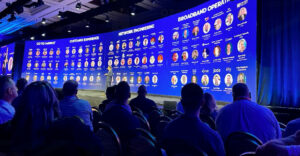
T-Mobile’s 700-MHz rollout has given its mobile users some of the fastest data speeds in the U.S. market, according to a report OpenSignal released Tuesday.
OpenSignal crowdsources data on carrier signal quality from users who have its consumer mobile application installed.
T-Mobile has the fastest 4G LTE download speeds in the country, overtaking Verizon by a slight edge. Its expanded LTE coverage is almost identical to AT&T’s coverage and is closing the gap with Verizon’s coverage, according to the “State of Mobile Networks: USA” report, which was based on speed tests conducted from Oct. 1 to Dec. 31.
“We think the story around the OpenSignal report is just as much about our LTE coverage gains, if not more so, as our being able to remain America’s fastest 4G LTE network,” said Viet Nguyen, senior communications manager for corporate communications at T-Mobile.
T-Mobile doubled its LTE footprint last year, adding nearly 1 million square miles of LTE and covering nearly 97 percent of Verizon’s customers, he told TechNewsWorld.
Speed Slowed by Throttling
How fast a carrier’s data flows may be less important to consumers than how it doles out that speed. Coverage area also may trump speed for customers.
“Being identified as the fastest mobile data provider can be a big win for any company, especially if proven by a neutral third party,” said John Turner, CEO ofUsersThink.
“The problem is, as it is easy to fact check these types of things, many, many more people would be hesitant to fully believe these claims if it was shown that a company like T-Mobile was actually throttling its data in a violation of net neutrality,” he told TechNewsWorld, referring to areport from the Electronic Frontier Foundation.
“The sad efforts of a certainCEO to dismiss the EFF does little to improve the public image of the company, no matter what other awards or tests it may win,” Turner added.
While data speed is important, what counts more for many mobile users is where they can get a signal, suggested Alex Merkulov, CEO of8th Sphere.
“I think most consumers care about network speed, but many care more about coverage area as well as signal strength and stability, he told TechNewsWorld. “For people who live behind thick stone walls in NYC or people who travel outside densely populated areas, Verizon should still remain the provider of choice.”
Just because customers get a fast download speed in one corner of an apartment does not mean they are getting a great mobile networking experience overall, Merkulov said.
Digging In to the Data
T-Mobile is meeting its goal of having more LTE coverage across the country, according to OpenSignal. T-Mobile users got LTE 81.23 percent of the time. However, it was third behind Verizon’s 86.73 percent and AT&T’s 82.63 percent.
4G download speeds for T-Mobile and Verizon averaged about 12 Mbps nationally, with T-Mobile edging out Verizon in a speed comparison in the 11 largest U.S. cities.
T-Mobile had the fastest 3G voice calls and the fastest 3G download speeds at 3.48 Mbps, OpenSignal found.
AT&T and Sprint showed much slower results, but all four major operators gained ground on their coverage footprints in the last quarter.
Numbers Count
Any time a challenger like T-Mobile or Sprint receives recognition from an independent, well-respected third-party source like OpenSignal, it is significant, according to Rob Chamberlin, chief revenue officer atDataXoom.
“It’s used not only in consumer-based advertising, but also by carrier B2B teams. T-Mobile has a rather low penetration rate in midmarket and enterprise relative to all of the other carriers, particularly Verizon and AT&T, so this might entice a business to more seriously consider T-Mobile as an option,” he told TechNewsWorld.
Network speeds become more relevant to consumers and businesses as more mobile applications utilize video.
Business apps like wearables are video-centric and require fast network speeds to work effectively. Network speeds are most noticeable and important when bandwidth-heavy apps are used, Chamberlin said.
Other Perspectives
OpenSignal’s speed test results differ considerably fromother accounts, according to Sprint, although it’s not clear what criteria those tests used.
OpenSignal also draws a comparison between the slower speeds of even the fastest U.S. networks and networks in other countries.
Countries with newer LTE networks have bigger spectrum blocks, OpenSignal concludes. The U.S. networks carry more users, however.





















































